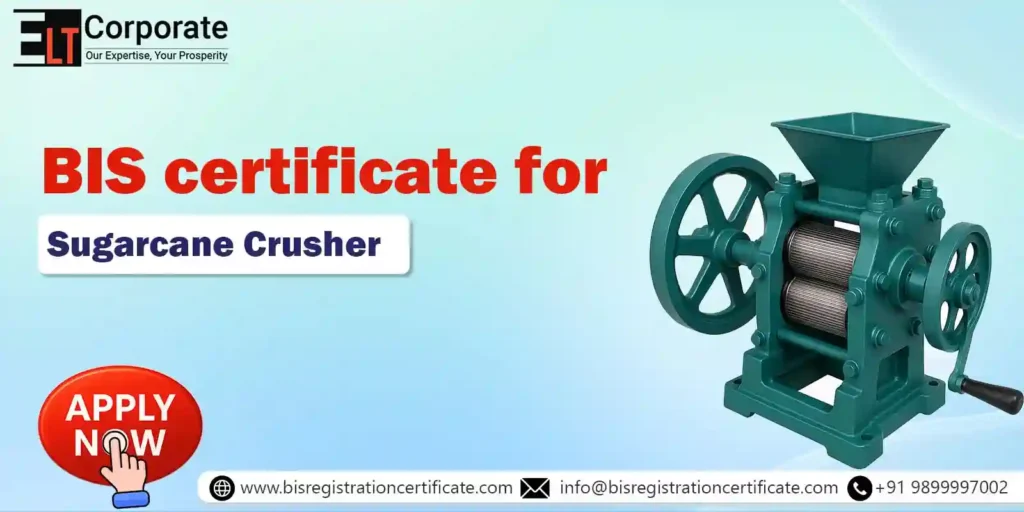The sugarcane crusher is one of the most usual machines used in India for both agriculture and industry to make juice and sugar. The BIS, on the other hand, requires manufacturers to get BIS certification before selling or giving away these machines in India to make sure they are safe, firm, and meet quality standards.
This article will explain BIS certification, why sugarcane crushers need it, how to get it, and how it helps manufacturers and consumers
What is BIS Certification?.
The Bureau of Indian Standards is India’s national standards body. It is in charge of creating and applying quality standards for a wide range of goods under the BIS Act, 2016.
The Indian Standards set safety, loyalty, and quality standards for products. Getting BIS certification means that a product meets these standards. The ISI mark is a sign of trust and compliance that manufacturers can use if they have BIS certification.
Read More: Introduction To Bureau Of Indian Standards
Applicable Indian Standard for Sugarcane Crusher
The relevant standard for sugarcane mills is:
IS 1973:1999 – Sugarcane Crushers – Specification
This standard specifies:
- Construction and design requirements
- Material specifications for components like rollers, gears, bearings, and shafts
- Performance parameters such as crushing efficiency and juice extraction ratio
- Safety provisions for operators and maintenance workers
- Testing methods to ensure conformity
Why BIS Certification for Sugarcane Crusher is Important
Below we mentioned why BIS certificate for sugarcane crusher is important
1. Legal Compliance: Sugarcane crushers are often listed under categories where quality certification is mandatory before sale in the Indian market.
Having a BIS license ensures your product is legally approved for manufacture and distribution.
2. Confidence of Quality: The BIS mark acts as a seal of trust, signifying that the machine meets important performance and safety standards. It increase customer confidence and strengthens brand reputation.
3. Market Access and Exports: For both domestic sales and exports, BIS certification is often a key requirement in government tenders, sugar unions, and export contracts.
4. Reduced Risk and Liability: Certified equipment minimises accidents, breakdowns, and warranty claims, thereby reducing overall operational risk.
Process of Obtaining BIS Certification for Sugarcane Crusher
Below we mentioned steps to obtain BIS Certificate for Sugarcane Crusher
1. Identify the Product Standard: Confirm that your product falls under IS 6923:1973 or any other updated IS standard.
2. Select the Certification Scheme: Depending on the product type, choose between:
- ISI Mark Scheme (Mandatory/Voluntary) for domestic manufacturers
- FMCS (Foreign Manufacturers Certification Scheme) for overseas producers
3. Testing at BIS-Recognized Laboratory: Submit your product sample to a BIS-recognized lab for testing as per the applicable IS standard.
4. Documentation and Application
Submit your application online at https://manakonline.in
along with:
- Factory details
- Manufacturing process flowchart
- Raw material details
- Test reports from approved lab
- ISO 9001 certificate (if available)
5. Factory Inspection (if required): BIS officials may conduct a site inspection to verify production capability and quality control systems.
6. Grant of License: Once compliance is confirmed, BIS issues a BIS License allowing the manufacturer to use the ISI mark on sugarcane crushers.
Read More: Process for getting BIS for Certification
Documents Required for BIS Certification for Sugarcane Crusher
Below we mentioned required documents for BIS certification for sugarcane Crusher
- Business registration (Company/LLP/MSME)
- Factory layout plan and machinery list
- Quality control and testing equipment list
- Test reports from BIS-approved lab
- Authorized signatory ID proof
- Manufacturing process flow diagram
- Product photos and labeling details
Read More: Documents Required For BIS Registration
Validity and Renewal of BIS License
A BIS license is initially valid for 2 years and can be renewed subsequently for up to 5 years by submitting:
- Updated test reports
- Renewal fees
- Proof of continued production
Cost Involved
The total cost for BIS certification includes:
- Application fee – ₹1,000 (approx.)
- Testing charges – as per lab and product
- Inspection fee – ₹7,000 + travel expenses (if applicable)
- License fee and marking fee – variable depending on production volume
How ELT Corporate Can Help
At ELT Corporate, we specialize in end-to-end BIS certification consulting for industrial machinery including sugarcane crushers.
Our experts assist in:
- Identifying the correct IS standard
- Preparing documentation and application
- Coordinating with BIS-recognized labs
- Managing factory inspections and renewals
We ensure faster approvals, error-free filing, and complete compliance support — saving your time and effort.
Conclusion
BIS certification for sugarcane crushers is not just a compliance formality – it is a commitment to quality, safety and reliability. Whether you are a small manufacturer or a large exporter, obtaining BIS certification increase your brand reputation and opens doors to new markets.
What is BIS Certification for Sugarcane Crusher?
It ensures that the sugarcane crusher meets Indian safety and quality standards under IS 6997.
Why is BIS certification required for Sugarcane Crushers?
It is mandatory to ensure product reliability, safety, and compliance with BIS norms.
Who issues the BIS certificate for Sugarcane Crushers?
The Bureau of Indian Standards (BIS) issues the certificate after product testing and inspection.









